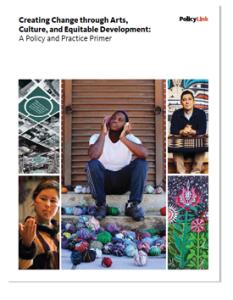
Author: Kalima Rose, Milly Hawk Daniel, and Jeremy Liu
Publication Year: 2017
Media Type: Report
Summary:
The community-centered arts and culture movement—made up of social justice artists, arts and culture agencies focused on racial equity, and cultural centers that serve communities of color and low-income communities— leads in securing cultural assets, building greater social cohesion, and feeding economic vibrancy. [Introduction p.4]
The report begins with a look at the arts and culture sector and the disparities that send the lion’s share of public arts support to large institutions and projects that predominantly reflect the expression of White and Euro-American culture. It moves on to examine places and policies that are advancing more equitable arts and culture investments, and the broad benefits that accrue from those investments. It also argues for restructuring public investments in the arts and culture sector to support capital projects, operations, and programming that can become cultural and economic engines in underserved communities. [Introduction p. 6]
Abstract:
Arts and culture are essential for building community, supporting development, nurturing health and well-being, and contributing to economic opportunity. Collectively, arts and culture enable understanding of the past and envisioning of a shared, more equitable future. In disinvested communities, arts and culture act as tools for community development, shaping infrastructure, transportation, access to healthy food, and other core amenities. In communities of color and lowincome communities, arts and culture contribute to strengthening cultural identity, healing trauma, and fostering shared vision for community.
Bridging Two Movements
Across the United States, growing movements focused on equitable development and community-centered arts and culture are uniting to strengthen the equity impact of their work. The equitable development movement—which brings a racial and economic equity lens to the community development field—depends on the engagement of communities of color and low-income communities in prioritizing, designing, and implementing their aspirations for the futures of their neighborhoods, cities, and towns. The community-centered arts and culture movement—made up of social justice artists, arts and culture agencies focused on racial equity, and cultural centers that serve communities of color and low-income communities— leads in securing cultural assets, building greater social cohesion, and feeding economic vibrancy.
Over the last decade, increasing collaboration between these two movements is yielding transformative and creative change. Arts and culture are critical elements of an equity framework; they reflect the assets of communities and enable cohesion in a pluralistic nation. Without equity, community redevelopment can improve a physical place but leave the people behind, stifle broad creativity, bring economic benefit only to a few, lead to a homogeneous community, or displace many. The tools of arts and culture can accelerate equity, build communities of opportunity, and design for broadly shared prosperity.
Committing to achieving equity requires responses to three questions: who benefits, who pays, and who decides. By reflecting the needs of people and place, arts and culture offer the means for engaging diverse and pluralistic communities in exploring such questions, and working together to find answers. To determine the desired outcomes, equity is the measure for success and a guide for course correction. [Introduction p.4]
Arts & Intersections: Equity & Diversity
Categories: Access and Equity, Civic Dialogue and Social Change, Community Development, Cultural Diversity, Cultural Planning, Economic Impact
ADDITIONAL BIBLIOGRAPHICAL INFORMATION
PUBLISHER INFORMATION
Name: Policy Link
Website URL: http://www.policylink.org/